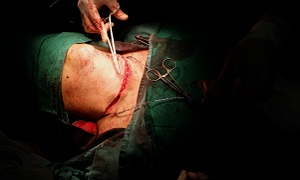Thyroidectomy
Thyroidectomy is a procedure which involves the removal of all or part of the thyroid gland. Located at the base of the neck, the thyroid is a butterfly-shaped gland, which produces hormones for regulating every aspect of one’s metabolism, starting from a person’s heart rate to how quickly they burn calories.
Thyroidectomy is used for treating thyroid disorders, which can include cancer, a noncancerous enlargement of the thyroid or an overactive thyroid. Depending on the reason for your surgery, your doctors will determine how much of your thyroid gland they will be removing. If they remove only a portion, then your thyroid might be able to function normally after surgery. However, if the entire thyroid needs to be removed, you will require daily treatment with thyroid hormone in order to replace your thyroid’s natural function.
Purpose
The presence of nodules or tumors on the thyroid gland is usually the common reason for thyroid surgery. Although most of the nodules are benign, some of them can be cancerous or precancerous.
Benign nodules can lead to problems, if they are large enough to obstruct the throat or if they stimulate the thyroid and overproduce hormones.
If the thyroid gland starts swelling or gets enlarged, it can be another reason for thyroid surgery, as such a condition can block one’s throat as well as interfere with eating, speaking and breathing.
Preparation
If you are suffering from hyperthyroidism, your doctor might prescribe you medication to regulate the thyroid function as well as to decrease any risk of bleeding.
You might also need to avoid eating and drinking for a certain period before the surgery. This will help in avoiding anesthesia complications. It is also better if a friend or relative is available to help you reach home after the procedure.
This procedure is generally performed under general anesthesia, so you will not be conscious during the entire time. First, the anesthesiologist will be giving you an anesthetic medication as a gas to breathe through a mask, or he/she will inject a liquid medication into a vein. Next, a breathing tube will be placed in your trachea, so that you are able to breathe properly throughout the procedure.
Several monitors will be placed by the surgical team on your body to make sure that your heart rate, blood pressure as well as your blood oxygen all remains at safe levels throughout the procedure. The monitors will be including a blood pressure cuff on your arm and heart-monitor leads which will be attached to your chest.
Procedure
Once you are unconscious, the surgeon will be making an incision low in the center of your neck. It might be placed in a skin crease, where it will be difficult to see once the incision is healed. After this, all or part of the thyroid gland is removed, depending on the reason for the surgery.
If you are having a thyroidectomy due to thyroid cancer, the surgeon might also examine as well as remove lymph nodes around your thyroid. Thyroidectomy generally takes between one to two hours. The time depends on the extent of your surgery.
There are multiple approaches to thyroidectomy, which includes:
Conventional thyroidectomy
In Conventional thyroidectomy, an incision is made in the center of your neck to access your thyroid gland directly. Most people are likely to be operated on using this procedure.
Transoral thyroidectomy
Transoral thyroidectomy approach uses an incision inside the mouth, to avoid making one in the neck.
Endoscopic thyroidectomy
In Endoscopic thyroidectomy, smaller incisions are used in the neck. Surgical instruments as well as a small video camera are inserted through the incision. Throughout the procedure, the camera will guide your surgeon.
After the surgery
You will either need to stay overnight at the hospital or go home the same day. You might experience some pain in the neck area, but medicine will help. You might also have a hoarse voice or sore throat for some days. There might be a drain as well from the site of the incision. It can help with healing and later it can be removed.
You will receive instructions regarding taking care of yourself after the operation and when to see your doctor for follow-up. If you require other cancer treatments, they can begin soon after the operation.
If all of your thyroid glands are removed, your doctor might be prescribing thyroid hormone replacement medicine for replacing the thyroid hormones. You might need this medication for the rest of your life and the doctor will need to make a few changes along the way to make sure you get the right amount. However, if only part of your thyroid was removed, you may not require any kind of thyroid hormone replacement medicine.
Once you reach home home, you will be able to return to your usual routine. However, you should wait for a minimum of ten days before you do any vigorous activity. It can take up to a year for the scar from the surgery to fade. Your doctor might recommend you sunscreen as it can help minimize the scar from being noticeable.
Risks
Like all major surgeries, thyroid surgery has the risk of an adverse reaction to general anesthetic. Heavy bleeding and infection are also possibilities in some cases.
However, risks that are specific to thyroid surgery occur quite rarely. The two most common risks are:
- Damage to the nerves connected to your vocal cords
- Damage to the parathyroid glands, i.e. the glands controlling the level of calcium in your body
Supplements can be used for treating low levels of calcium. It is important for the treatment to begin as soon as possible. If you feel nervous or jittery or if your muscles start twitching, you need to inform your doctor immediately, as these are signs of low calcium.
It is also notable that out of all patients having a thyroidectomy, only very few will develop hypocalcemia. Out of those, approximately 75 percent will recover within a year.

